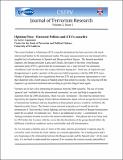Files in this item
Electoral politics and ETA’s ceasefire
Item metadata
| dc.contributor.author | Argomaniz, Javier | |
| dc.date.accessioned | 2014-10-29T16:27:44Z | |
| dc.date.available | 2014-10-29T16:27:44Z | |
| dc.date.issued | 2011-01-24 | |
| dc.identifier.citation | Argomaniz, J. (2011). Electoral politics and ETA’s ceasefire. Journal of Terrorism Research, 2(1), pp. 62-64. | en_US |
| dc.identifier.issn | 2049-7040 | en_US |
| dc.identifier.uri | http://ojs.st-andrews.ac.uk/index.php/jtr/article/view/175 | en_US |
| dc.identifier.uri | https://hdl.handle.net/10023/5604 | |
| dc.description.abstract | The recent Euskadi ta Alkartasuna (ETA) ceasefire declaration has been received with much interest and fanfare by the international media. The same announcement was met instead with a tangible lack of enthusiasm by Spanish and Basque political figures. The Spanish president Zapatero, the Basque president Lopez and Urkullu, the leader of the most voted Basque nationalist party (PNV), agreed that the communiqué was a ‘step forward’ but ultimately ‘insufficient’ and ‘not the news the country had been hoping for’. Such mix of scepticism and disappointment is partly a product of the previous failed experience with the 2006 ETA truce. Months of painstakingly slow negotiations between ETA and government representatives were then shattered with a bomb attack at Madrid airport that killed two people. The outcome left the Zapatero’s government frustrated and unwilling to get their fingers burnt again. | en_US |
| dc.language.iso | en | en_US |
| dc.publisher | Centre for the Study of Terrorism and Political Violence, University of St Andrews | en_US |
| dc.relation.ispartof | Journal of Terrorism Research | en_US |
| dc.rights | This is an open access article published in Journal of Terrorism Research. This work is licensed under a Creative Commons Attribution 3.0 License (http://creativecommons.org/licenses/by/3.0/) | en_US |
| dc.rights.uri | http://creativecommons.org/licenses/by/3.0/ | |
| dc.subject | ETA | en_US |
| dc.subject | Spain | en_US |
| dc.subject.lcc | HV6431 | en_US |
| dc.subject.lcsh | Terrorism | en_US |
| dc.title | Electoral politics and ETA’s ceasefire | en_US |
| dc.type | Journal item | en_US |
| dc.description.version | https://doi.org/Publisher PDF | en_US |
| dc.publicationstatus | Published | en_US |
| dc.status | Peer reviewed | en_US |
| dc.identifier.doi | https://doi.org/http://doi.org/10.15664/jtr.175 | en |
This item appears in the following Collection(s)
Except where otherwise noted within the work, this item's licence for re-use is described as This is an open access article published in Journal of Terrorism Research. This work is licensed under a Creative Commons Attribution 3.0 License (http://creativecommons.org/licenses/by/3.0/)
Items in the St Andrews Research Repository are protected by copyright, with all rights reserved, unless otherwise indicated.


